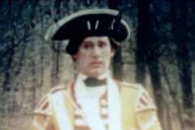
| Saturn Will Not Sleep - Discovery (Official Video) |

|
| home | movie reviews | features | sov horror | about | forum |
The Deserter D+
Year Released: 2003
Although The Deserter is set during the American Revolution, director Eric Bruno Borgman's flag really waves for the Roaring Twenties, when screen jesters often donned uniforms merely to fix their demon madness within a negotiable universe. Like Chaplin in Shoulder Arms, Borgman lobs surreal grenades at the military's puffed-up chest, but he's not really interested in the conflict between roughhousing and regimentation. What he's really after is simple mimesis; he tells his story sans dialogue and strews the adventure with old-fashioned sight gags pilfered from his favorite silent clowns. Borgman clearly adores silent slapstick -- I wouldn't be surprised to learn he's a card-carrying member of the Sons of the Desert -- but his superficial ape routine wears out fast. There are few pleasures that compare to the delirious swelling of laughter that cascades through an auditorium flickering with images of Keaton, Chaplin, or Laurel and Hardy, and Borgman rightfully recognizes that their movies still possess the power to hold audiences. Yet I'm skeptical that he's asked himself what that hold is all about. The director himself plays a redcoat drummer boy accidentally separated from his regiment, and at one point he anxiously chases his canteen as it drifts downstream. (Borgman, an aspiring actor who previously appeared uncredited in Mystic River and Mr. Deeds, spent 10 real-life years playing the drums as a re-enactor.) By merging simple innocence with comic disaster, this scene reveals a respect for how comedy was manufactured in the Twenties, but not a full grasp of its artistic architecture. The timing is off, the editing isn't crisp, the spaces aren't used resourcefully, and the gags never zing, never build to a crescendo. Stan Laurel, by contrast, would deconstruct a pratfall by performing every variation imaginable as the stakes increased; here, the gags don't build, they just go on until they end. We can only daydream about which cunning maneuver Keaton might have invented to peak the canteen scene, but surely we can agree that he wouldn't have settled for witlessly fishing it out with a stick. More importantly, the gags never feel like a natural extension of a well-defined character or story. Shouldn't the drummer have something invested in the canteen, or at least in duty well performed? In The General, Keaton's heroism is partially spurred by a desire to impress a girl, and in Steamboat Bill, Jr., they're pushed by a need to connect with his disapproving father. In The Deserter, the drummer is merely a buffoon trapped in a narrative and emotional vacuum. The great silent comedians were comic technicians, yes, but more integral to their cultural status is their ability to chisel characters of enduring humanity. Consider Keaton's humorless everyman, Chaplin's guileless tramp, Lloyd's bespectacled citizen, or Langdon's baby-faced simp. To a fault, their expressive faces are crucial gears in their comedy machinery, but Borgman's face and eyes are sorely underutilized. Since he is routinely denied the status of identification figure, the drummer boy as a comic creation remains strangely unformed, unapproachable, and unknowable. It's tempting to assume Borgman thinks the great silent clowns were just funny, just telling jokes about getting kicked in the arse. Doesn't he realize that their sheer physicality was used to turn every setback or triumph into an observation about how we all feel about our own bodies? Doesn't he see that Chaplin's main subject was the difficulty in dealing with a society unwilling to deal with him? Doesn't he recognize that Keaton investigated the role of machinery in our daily lives? I suspect that he does, and suspect that he simply became caught up in his nuts-and-bolts slapstick. (I suppose that's easy when one scene calls for you to dangle from a cliff by one foot.) That reluctance to put down his children's toys might explain why Borgman allows the marching and battle sequences, which feature confused Revolution re-enactors, to loiter around in clumsy, interminable long shot. (Is it worth noting that most of the best-known war silents instead dealt with the Civil War, the ramifications of which were still on the nation's mind?) Emulation isn't always the best place to start as an artist -- I think of Adam Abraham's recent Man of the Century, which also tried to revive a 1920s style with uneven results -- and while The Deserter is obviously a parody made from love, that doesn't mean there's any reason to see it rather than the real thing. Borgman marches to the beat of Old Hollywood, but never to his own: These simplistic appropriations can't possibly earn his drummer boy a privileged space next to his models. And why ain't this thing in black-and-white? Review published 03.03.2004.
|

|
| home | movie reviews | features | sov horror | about | forum |
| This site was previously at flipsidemovies.com from 2000 to 2008. |
|
contact | copyright | privacy | links | sitemap
Flipside Movie Emporium (FlipsideArchive.com)
|